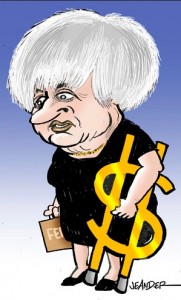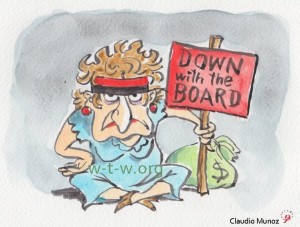The fact that the US Federal Reserve commands a tense watch as possible dates for a rise in rates come up shows how powerful the Fed has become. Whether this is good or not is debatable. It’s also a fact of US life right now.
With the next interest rate decision coming from the Federal Reserve on Wednesday, Wall Street is voicing some distress that Janet Yellen is overly ambiguous about the path of the Fed’s monetary policy.
“There’s a little criticism starting to stir, that she’s not very clear about what matters the most to her or other members of Federal Open Market Committee (FOMC),” said Hugh Johnson of Hugh Johnson Advisors.
Charles Plosser, a former Philadelphia Fed president, has described as a “problem” the desire to reach consensus on FOMC statements that he believes has made them “more vague and uncommunicative.”
Yellen reinforced the notion in a recent speech in Philadelphia, saying investors should not count on the Fed to map out its plan for rate hikes.
“Charlie Plosser and a lot of others would like her to be more transparent. They’re saying something just short of ‘tell us what you’re going to do,’ which is unreasonable at best. They [Fed members] don’t know until they get into the meeting,” Johnson said of the FOMC, which begins its two-day policy-setting session Tuesday.
“I think those rumblings are unfounded. I think she’s been abundantly clear,” Johnson said, referring to Yellen’s frequently repeated refrain that Fed moves are data-dependent.
The Fed has also made clear that it’s looking to hike borrowing costs, with its stated strategy most recently derailed by a shockingly poor jobs report in May.
The Fed is eager to normalize, and would love to increase rates two to three times this year, according to Tom Anderson, chief investment officer at Boston Private Wealth. But he added, “they need the data to show up in a certain way to make the market digest their decisions better.”
Yellen and her colleagues are under pressure to raise rates, in large part because if the economy runs into trouble they need to have some room to lower them again.
The Fed is looking to avoid a scenario where they “don’t have any arrows in their quiver” should it appear the economy is headed into a recession a year or so down the road, Jim Russell, principal and portfolio manager at Bahl & Gaynor, said.
What’s needed, in Anderson’s view, is a good jobs number for June, a slightly higher inflation number or further growth in wages. “If we get any positive data points that would support the case for raising, July is a definite possibility. If not then, they’ll be looking at September.”
“The jobs report was weak, but the overall employment data has been consistently in the right direction,” Anderson said. “The trend has been in favor of a hike.”
“By any objective measure, 4.7 percent, that is full employment,” Russell said of the nation’s unemployment rate. “And it does appear that the inflation rate is starting to increase a bit, to a level where they need to cut off extraordinary accommodation.”
If the June jobs report shows the May report was “not a fluke, then we’ll have an entirely different conversation,” Anderson said.
However, Johnson also pointed out that “The numbers don’t tell you everything. Yellen thinks broadly about what’s going on in the world. She cares about the dollar, she cares about Brexit, she cares about the global financial markets and what’s going on in China.”
So long as the U.K. remains in the European Union and the June nonfarm payrolls numbers don’t confirm a trend that May’s awful numbers imply, the Fed will hike two times in 2016, Johnson and Russell believe. Anderson thinks Yellen & Co. will move only once before the end of the year.
“My guess would be July and October,” Johnson said.








